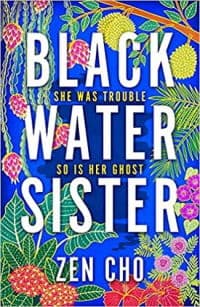
Black Water Sister by Zen Cho
(Pan Macmillan, 2021)
Reviewed by Anne F. Wilson
Jessamyn Teoh is a normal Malaysian Chinese American girl. Her parents don’t go on about spirits and ghosts (or “good brothers”). So it comes as a shock to her to find, on the eve of their departure for Penang, that she is being haunted by the ghost of her mother’s mother, Ah Ma.
Jess is nineteen and has lived for the whole of her life in the United States. A Harvard graduate, after seven months she still doesn’t have a job. Jess’s father is in remission from cancer and their finances are precarious, so they are going home to the relatives in Malaysia, where Jess’s father’s brother-in-law has arranged a job for him. Faute de mieux, Jess is going with them.
Jess, however, is resilient and she has plans. Her girlfriend, Sharanya, is preparing to study for a PhD in Singapore and all Jess has to do is find a job and follow her there. Unfortunately, Ah Ma also has plans, and they involve Jess.
In life, Ah Ma had been the medium of a Goddess, the eponymous Black Water Sister. Now the Goddess’s temple is being threatened by development and Jess is landed with the task of stopping this. Worse, the developer, Dato’Ng Chee Hin, the fifth richest man in Malaysia, is a samseng or gangster. Having made his billions, he is now acting like an honest businessman and has government connections, but he still has underworld resources to call on, gangs of thugs with parangs and guns.
The story bounces along as Jess tries to deal with her dead grandmother and the goddess whose medium she is. In Ah Ma the author has created an authentic character through use of her voice in Jess’s head—tough, disillusioned, bossy, with a smoker’s rasp. From Ah Ma Jess finds out about her family history and learns how to negotiate with gods and ghosts. Unfortunately, she finds herself unable to tell Sharanya about what is going on, which cripples their long-distance relationship. Ah Ma also discovers that Jess is gay, a thing that she has not been able to bring herself to tell her parents.
The charm of the novel lies in its Malaysian setting. The author was born and raised in Malaysia, and she translates the environment for the reader with energy and affection. She deftly uses dialect to draw the reader into the story. Jess’s aunt lives in a two-storey “bungalow” with marble floors and teak furniture. In the course of the novel Jess visits shophouses and food stalls, gentrified coffee shops, airconditioned high rise office buildings and (of course) temples as she tries to exorcise her spirits. Through Ah Ma’s memories we also see glimpses of the jungle and the rubber plantation where she scraped a living.
Jess’s relatives are entirely believable: curious, kind, voluble in Manglish (Malaysian English; Jess’s Hokkien is merely adequate, except when she is taken over by Ah Ma) and paying attention when it suits them. Manglish is an addictively economical language—after reading I found myself asking my husband “What time you want eat?” Family members are referred to by their relationships rather than their names—Kor Kor is father’s sister, her husband is Kor Tiao, Ah Ma is grandmother, Ah Ku is mother’s brother.
While this is delightful and charming, Cho also describes frightening violence, both when humans interact with gods and spirits, but also when Jess comes face to face with Dato’Ng’s thugs. The scene where she and Ah Ma confront him in his office is gripping and is followed by truly believable and frightening violence. With her own courage and self-reliance, Jess manages to find a satisfying resolution to her ghostly problems. Now all she has to do is sort out her personal life.
In case it was not obvious from the review, I thoroughly enjoyed this book, and can highly recommend it.
Review from BSFA Review 15 - Download your copy here.
